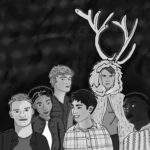How you arrive at the perfect book as an author depends entirely on your writing perspective. So let’s start with a quiz to figure out your stance on plotting. Answer these truthfully, because there’s no right or wrong answer.
- I often figure out where a book’s or show’s storyline is going.
- True
- False
- I delight in the unexpected.
- False
- True
- The perfect book has no loose ends.
- True
- False
- Plot holes aren’t the end of the world.
- False
- True
- Every detail in a narrative must mean something.
- True
- False
- I hate it when a detail is incorrect, didn’t any research get done?
- True
- False
Mostly 1’s: Congratulations! You’re a plotter!
Mostly 2’s: Congratulations! You’re a pantser!
Equal 1’s and 2’s: Congratulations! You’re both a plotter and a pantser!
So what does your answer mean?
PLOTTER:
If you’re a plotter, you like to have every detail arranged. You’ve done all your research ahead of time and organized all your notes so they’re available at the ready. Your perfect book is flawlessly arranged from beginning to end and it reads beautifully. Before you even type the first word you know where you’re going and what words will take you there. You’re meticulous and it works to your advantage.
When you plan your books, you should: create lists of characters, settings, and plot with details about how they all relate; sort out all the action and dialogue; do your research first; figure out your characters’ motivation; know the book’s climax; and lay out the storyline across all chapters.
Beware: Your need for perfection, might keep you from starting the book and finishing it. Keep to a writing schedule and a word count goal.
PANTSER:
If you’re a pantser, you go with the flow. Day by day you’re not sure where the characters will take you, but you’re up for the task. You’ll research on the spot as ideas and situations come up. You like how things tend to come together in a serendipitous fashion. Everything works out in the end, and if it doesn’t, you’ll fix it on the next draft. You don’t sweat the small stuff. You know every word is the right word at the time, and can be changed if it turns out it isn’t a perfect fit. Others might see this laissez-faire attitude and think you don’t care, but you care immensely.
When you plan your books, you should: put together idea boards for characters, setting, and plot; keep a notebook filled with any odds and ends that strike your fancy from words you like to doodles you make to research you did; use Post-Its to arrange plot points, if you know them; and look outside yourself for inspiration and ideas, whether it be in magazines and books or museums and art.
Beware: Your ability to overlook a troubling spot in the book, could impact your ability to edit later. Highlight anything you have questions on, so you won’t forget and can address them later.
BOTH:
If you’re a bit of both a plotter and pantser, you combine the best of both types of writing. You plan, but don’t stifle. You go off on tangents, but always bring the story back on point. A loose end can always be addressed in the sequel. You write with purpose, but allow for changes in direction. When you think about writing you try to figure out what works for you and your style.
When you plan your books, you should: mix and match techniques, try something new each time, and keep doing something that worked before for you.
Beware: You can fall down a rabbit-hole of either plotter or pantser techniques if you’re not careful. It’s like fad diets – if it’s not working for you, drop it.
I, myself, fall into the “Both” category. I keep folders organized for each book on my computer. They contain all my research, fragments of scenes that I started, but continued in another direction or removed entirely, and inspiration from drawings, images, videos, etc. I have pretty much compiled a guide to my world that I can access at the drop of a hat with pronunciation guides, maps, character bios, etc. I keep a notebook filled with the finer details about my characters, places, and world. It contains note cards I have received about my books from fans and advertisements I have done to promote the books. It’s my touchstone and my keepsake of this precious journey I’ve gone on.
How about you? Where do you fall? What techniques do you use?





